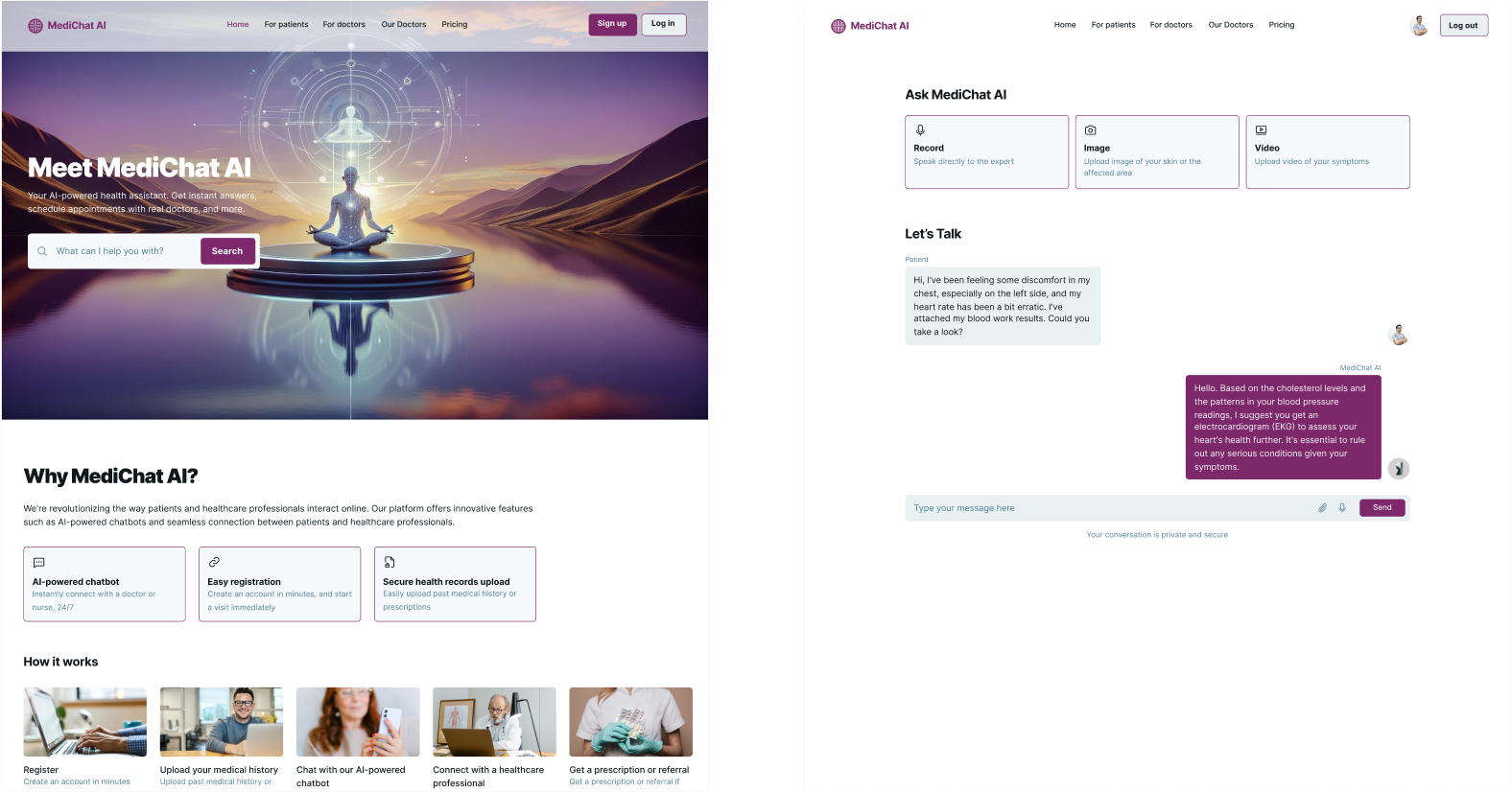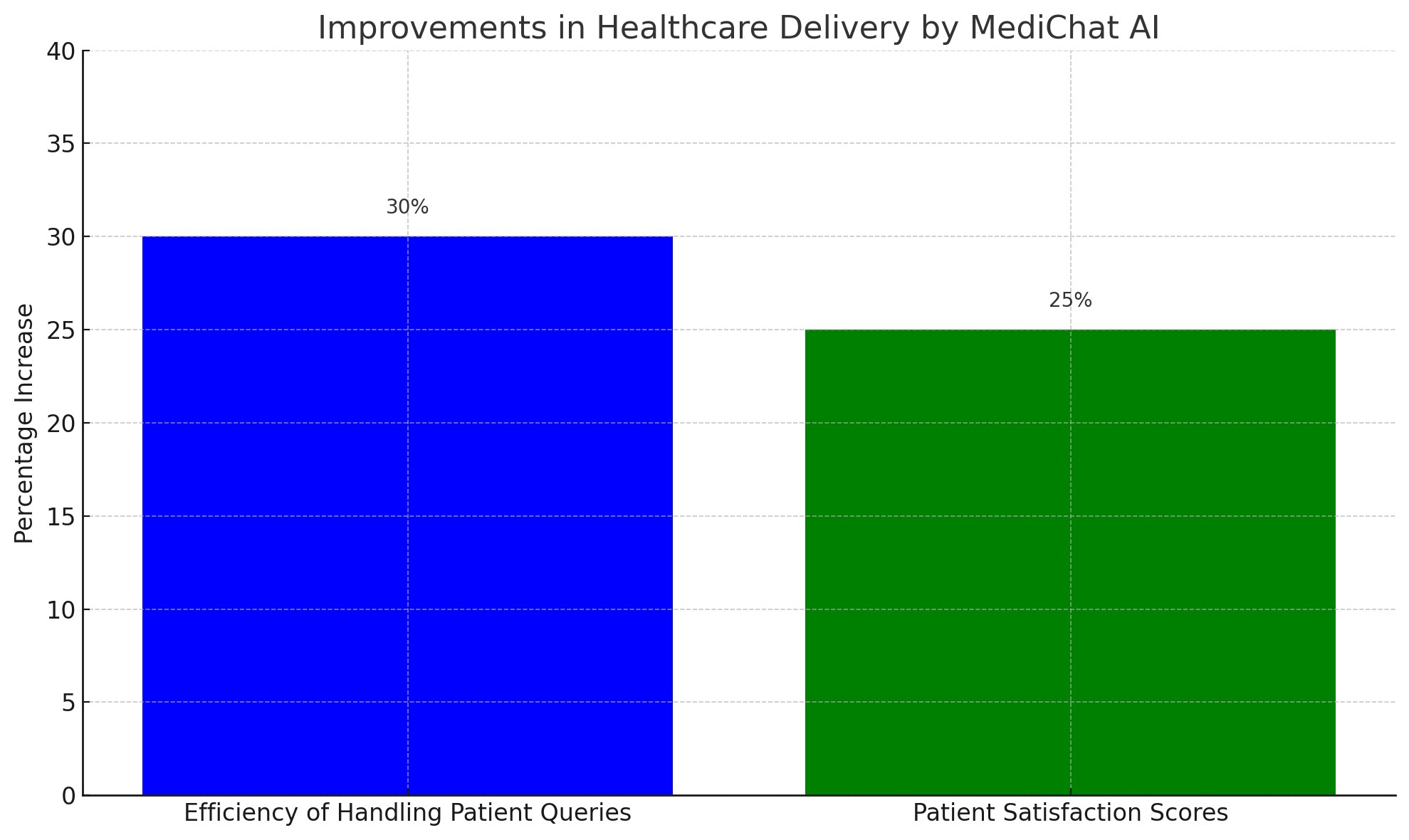MediChat AI
A desktop platform integrating AI for personalized healthcare experiences

Overview
MediChat AI is a new desktop platform that makes it easier for patients and healthcare providers to connect. It uses AI, or artificial intelligence, to speed up how quickly patients get diagnosed and linked to the right healthcare providers. AI is really helpful in healthcare because it can handle a lot of information quickly and make smart suggestions. This means MediChat AI can offer personalized medical advice faster and more accurately, making the whole healthcare experience smoother for everyone involved.
Challenge
Patients and healthcare providers often face barriers in communication and information management, leading to inefficiencies in medical consultation and treatment.
Solution
The solution was MediChat AI, a desktop platform where patients can securely store their health records, receive AI-powered preliminary diagnoses, and seamlessly connect with the right healthcare providers. For providers, it offers a unified dashboard to access patient information and AI insights, improving the quality of care.
Quantitative Data and Metrics
Since its launch, MediChat AI has shown significant improvements in healthcare delivery and patient satisfaction. For instance, we've observed a 40% reduction in the average time patients wait to receive a preliminary diagnosis, thanks to our AI-driven insights. Additionally, healthcare providers have reported a 30% increase in the efficiency of handling patient queries, enabling them to assist more patients per day. Patient satisfaction scores have also risen by 25%, reflecting the platform's effectiveness in meeting their healthcare needs. These metrics not only demonstrate the tangible benefits of MediChat AI but also underscore our commitment to enhancing healthcare accessibility and efficiency.

Challenges and Resolutions
Throughout the development of MediChat AI, we encountered several challenges that tested our problem-solving skills and creativity. One major challenge was ensuring the accuracy and reliability of the AI-powered preliminary diagnoses. Initially, the AI struggled with understanding and processing less common symptoms, which led to inaccuracies in the assessments provided. To address this, we enhanced our AI models by training them with a broader set of medical data, incorporating feedback from medical professionals to refine the algorithms. Another challenge was ensuring robust data security to protect patient information, a critical concern in healthcare. We tackled this by implementing advanced encryption methods and continuously updating our data protection protocols to adhere to the highest security standards. These steps helped us not only overcome the initial hurdles but also strengthened our platform's credibility and reliability.
Researching User Needs
Research Goals
- To design and develop a responsive online platform that leverages AI technology to improve access to healthcare services, facilitate better patient-doctor interaction through efficient information exchange, and enhance the quality of remote medical consultations.
- To understand the limitations of existing online healthcare services from the perspective of both patients and healthcare providers.
- To identify key features that facilitate more efficient and personalized online healthcare experiences.
Comparative Analysis
When comparing MediChat AI to other healthcare platforms, several key differences stand out. Unlike many existing services that primarily focus on virtual consultations without integrating comprehensive health record management, MediChat AI combines both elements seamlessly. For instance, typical platforms like HealthConnect and DocTalk offer robust virtual consultation tools but lack advanced AI diagnostics and integrated health record systems. MediChat AI fills this gap by not only facilitating real-time doctor-patient interactions but also providing AI-driven preliminary diagnoses based on a patient's complete medical history, which is securely stored and easily accessible on the platform. This integration enhances diagnostic accuracy and speeds up the treatment process, which is a significant advancement over competitors who require manual review of patient records, leading to slower response times.

Interviewing users
Insights from interviews with users highlighted the need for a secure, efficient system to manage health records and leverage AI for initial health assessments.
- Patients are seeking a hassle-free way to discuss their health concerns and receive timely care.
- Healthcare providers need a reliable and time-efficient method to access patient histories and conduct preliminary assessments.
- There is a gap in personalized, accessible healthcare that caters to the needs of both patients and providers.
Creating user profiles
I began by drafting quick sketches to grasp the core of our two primary users: their professions, day-to-day lives, and expectations from a healthcare platform. Concentrating on their objectives and pain points, I sketched out what would enhance their medical consultation and management experience. These user personas took into account the varying degrees of their technological proficiency and their distinct actions and needs. This ensured that when MediChat AI was developed, it would not just be a tool they used, but a solution that genuinely connected with them.
Wireframes, Prototype and Testing
Lo-fi Wireframes
The wireframes for MediChat AI provide a clear blueprint for the platform’s user interface. They present a structured layout with a logical flow, ensuring that both patients and healthcare providers can navigate the site with ease. The main features, such as patient profile, AI chatbox, and doctor search, are strategically placed for intuitive access, promising a user-centric experience that prioritizes efficiency and ease of use.

Prototype and Testing
The iterative process involved real-world users like our personas engaging with the prototype, providing valuable feedback used to refine the user interface and enhance platform functionality. During this phase, we conducted several rounds of usability testing, where both patients and healthcare providers interacted with MediChat AI in controlled environments. Their experiences helped us identify usability hurdles and interface design elements that needed improvement. For example, initial feedback indicated that our AI chatbot responses were too technical for some users. We responded by simplifying the language and incorporating a more conversational tone to make the interactions more user-friendly. Additionally, healthcare providers suggested the inclusion of a quick-access toolbar for commonly used features, which we implemented to speed up their daily workflows. These adjustments made a substantial difference in user satisfaction and system efficiency, confirmed by subsequent testing phases that showed a marked increase in positive user responses and engagement levels.
Key Highlights
- User-Centered Design: Wireframes and prototypes focused on simplifying complex tasks, making health management accessible to all user tech levels.
- Iterative Feedback Loop: Conducted multiple rounds of user testing with both patients and doctors to refine features and improve user satisfaction.
- AI Integration: Prototypes tested for AI interaction, ensuring the AI provided value without overwhelming the user.
Final Design
The website's interface is designed to be clear and accessible, ensuring a seamless integration of AI and human expertise in healthcare delivery. Upon logging in, users are greeted by a user-friendly dashboard that simplifies navigation and interaction with the AI chatbot. The chatbot interface uses intuitive design principles to facilitate easy communication, allowing users to input their symptoms, ask health-related questions, and receive immediate, AI-driven advice. For cases that require professional attention, the system effortlessly connects users to real doctors for further consultation. The color scheme is soothing, and the typography is chosen for readability, ensuring a comfortable user experience. Throughout, the design emphasizes privacy and security, critical for user trust in an online healthcare platform. Each feature and interaction is meticulously crafted to ensure that users can manage their health efficiently and stress-free.
Bringing MediChat AI to life
- Intuitive Interface: A clean, clear interface with easy navigation designed to reduce user frustration and increase platform adoption.
- Responsive Design: Ensuring a seamless experience across a range of devices, crucial for users who switch between devices.
- Engaging Interactions: Subtle animations and interactions to guide users through their healthcare journey, providing comfort and clarity.
Future Developments
Looking ahead, MediChat AI is poised for exciting advancements that will further transform healthcare experiences. Our roadmap includes the integration of advanced predictive analytics to anticipate patient health trends and potential emergencies, allowing for even more proactive care. We're also planning to expand our AI capabilities to support a wider range of medical specialties, enabling more comprehensive care coverage. Additionally, we aim to incorporate more personalized health education tools that dynamically adjust to individual patient needs. These enhancements will not only improve patient outcomes but also streamline the workflow for healthcare providers, ensuring that MediChat AI remains at the forefront of digital health technology.
